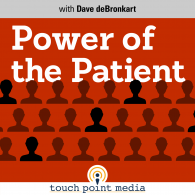

In Episode 1, I shared the purpose of this podcast – to help you help healthcare achieve its potential by being an involved, informed, “engaged” e-patient: a potent partner for your busy health professionals. I shared my own near-death cancer story, and how my oncologist says he’s not sure I would have survived if I hadn’t been so involved.
In episode 2 we meet my first e-patient guest, Larry Fagan, whose story is a great example of what a difference it make when patients and families do everything in their power to help their medical team – and the medical team welcomes it. Key takeaways:
- It’s helpful to understand the decision process the care team will be going through, so you can organize your thoughts to match theirs.
- Physician attitudes are changing, to increasingly welcome informed, engaged patients. Informing yourself doesn’t mean you’re trying to tell them what to do!
- It’s helpful to learn about the disease itself, including its treatment options. (Sometimes there’s no single “best answer.” It makes sense to be well informed and express your preferences.)
- “Joining an online medical group is extremely important” – he learned a lot about treatment options, side effects, and common patient experiences. (Sometimes, as in Larry’s case and mine, group members may know things a doctor hasn’t heard – valid things that aren’t in the medical literature)
Mentions from the Show:
- Patient communities (a small selection of the many):
- SmartPatients.com (community of patient groups; current home of my ACOR kidney cancer group)
- Inspire.com (another community of patient groups)
- My own website’s list of patient communities
- Some communities are active at ACOR, while others have migrated to Smartpatients. This seven minute interview with ACOR founder Gilles Frydman on PatientPower has the back story. Amazing stuff!
- Some specific diseases have Facebook groups (you may have to ask around – some are private groups, so not found in searches)
- Books:
- How Doctors Think by Jerome Groopman
- Norman Cousins’ book Anatomy of an Illness as Perceived by the Patient
- Let Patients Help (by Dave and his PCP, Dr. Danny Sands)
- Websites for good health information
- NCCN (National Comprehensive Cancer Network) – treatment guidelines
- Health libraries at major medical centers
- Academic medical center websites, e.g. Mayo Clinic: Patient Care/Health Information
- Medline+ from National Library of Medicine:
- Disease websites (use Google to find ). Example of Lymphoma/Leukemia Specific Websites: Lymphoma Research Foundation, Leukemia & Lymphoma Society
Find us online:
More About Larry Fagan:
Lawrence Fagan’s research interests have been at the intersection of computers and medical care since 1975. He helped run the Biomedical Informatics Training Program at Stanford University for nearly thirty years. His current research interest is in the area of patient-focused participatory medicine and patient safety. Lawrence received his undergraduate degree in Interdisciplinary Science (Artificial Intelligence) from MIT, his PhD in Computer Science from Stanford University, and his MD from the University of Miami. He was elected to fellowship in the American College of Medical Informatics.





